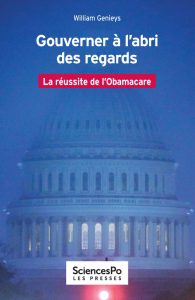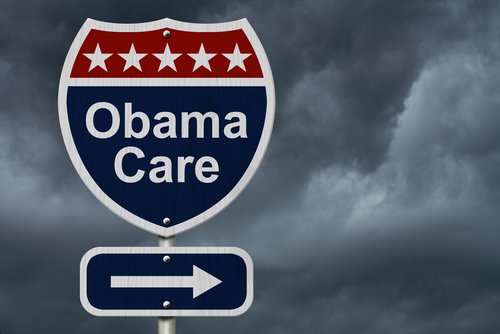


When Earning a Living Costs Your Life
16 March 2021
When Econometrics Sheds Light on the History of Social Relations
16 March 2021 Does the idea of all-powerful elites shaping public policy to align with their interests reflect reality? If so, how do they pull it off? If not, what is their actual influence, how do they operate, and what interests drive them? William Genieys, a political scientist and sociologist at the Centre for European Studies and Comparative Politics, has a long-standing interest in these questions. After studying the French and Spanish elites, he more recently turned his attention to U.S. elites. In his latest book, Gouverner à l’abri des regards. La réussite de l’Obamacare [Governing out of sight. The Obamacare success] (Presses de Sciences Po, September 2020), he uncovers the role of U.S. policy elites – and in particular of so-called long-term insiders – in the emblematic reform of Barack Obama’s presidency, on healthcare. Interview.
Does the idea of all-powerful elites shaping public policy to align with their interests reflect reality? If so, how do they pull it off? If not, what is their actual influence, how do they operate, and what interests drive them? William Genieys, a political scientist and sociologist at the Centre for European Studies and Comparative Politics, has a long-standing interest in these questions. After studying the French and Spanish elites, he more recently turned his attention to U.S. elites. In his latest book, Gouverner à l’abri des regards. La réussite de l’Obamacare [Governing out of sight. The Obamacare success] (Presses de Sciences Po, September 2020), he uncovers the role of U.S. policy elites – and in particular of so-called long-term insiders – in the emblematic reform of Barack Obama’s presidency, on healthcare. Interview.
Along with your two previous studies on Catalan and Andalusian political elites in Spain and on French policy elites, this book forms a comparative trilogy about elites, politics and policy . What is the genesis of this work?
William Genieys: I began this research series with an analysis of the role of representative elites in Catalonia and Andalusia (ie Parliamentarians) in the transformation of the Spanish State. Then turned to examining how a group of state elites helped reinvent the Social Security model and transform National Defense policies in France. I approached the U.S. case by going back to the question I had explored regarding the role of state political elites in French public policymaking. But my take on elites evolved here. Writing a textbook on sociology and theory of elites helped me identify the ‘pitfalls’ and promising research paths. This led me to shift the analytical focus from political elites to those in the political entourage who shape the content of the programmatic orientations of public policies, and sometimes even the content of the decision.
Finally, my study of U.S. policy elites analysed the influence of long-term insiders [which I broadly define as individuals with long-held policymaking roles] in the achievement of Obamacare(1)This research on the U.S. case would not have been possible without funding from French Agency for Research and its German counterpart – DFG, Deutsche Forschungsgemeinschaft..
Why did you choose the U.S. case?

1%’ and the ‘superrich. © Prazis Images, Shutterstock
William Genieys: For two reasons: first, the question of elites operating in the political field fell off the research agenda in the U.S. years ago; second, this issue revolves around a critique of elitism in the U.S. today. On the one hand is the problem of the ‘1%’ and the ‘superrich’ (the main targets of the Occupy Wall Street movement) that is central to sociology and critical economics. On the other hand is the condemnation of the dark power of Washingtonian elites on K Street(2)K Street is one of the main streets in Washington known for being home to many think tanks, lobbyists, and defense groups and in the Deep State (3)Deep state is an expression designating a parallel or informal body within a state secretly holding decision-making power over society and all the political choices of a democracy. that former President Trump underscored. My work on Obamacare attests to the fact that there is no deep state, but rather – as is the case in France – ‘elites’ who defend the public interest while circulating between the private and public sectors as administrations change(4)William Genieys, Trump, « l’Obamacare » et le deep state, AOC, 30 octobre 2020..
You chose to examine the role of policy elites in Obamacare for this study…
William Genieys: Yes, these policy elites gravitating in the healthcare sector and supportive of the Democratic Party chose to push for a consensual reform with the goal of expanding coverage to 22 million people. In order to study how this choice was made, my team and I conducted a large number of interviews and created more than forty sociological portraits of the players involved – the ones I refer to as long-term insiders. These interviews showed that during Bill Clinton’s term, the conflict between different models (single payer, pay-or-pay, managed competition) within Democratic elites resulted in reform failure. Their inability to agree to leave millions of people without health insurance. I think this became a political lesson learned for these veterans of the Clinton administration, who later – during the Bush administration – joined the private sector (think tanks, private policy departments, Georgetown University, etc.).

Governor Bill Clinton greets patient at a nurse’s job training program at the Maxine Waters Employment Preparation Center in 1992, So. Central, LA. © Joseph Sohm / Shutterstock.com
This was one of the drivers of their quest for a consensual reform plan. The long-term insiders, whose professional careers I carefully studied over time, developed the outlines of a far-reaching syncretic reform while avoiding the trap of a “systemic” reform.
How did you specifically proceed to identify these elites?
William Genieys: I have developed a groundbreaking Programmatic Action Framework (PAF) to public policy elites(5)For a generalisation of the approach: William Genieys, Patrick Hassenteufel. (2021). « The Programmatic Action Framework : An Empirical Assessment », European Policy Analysis, vol. 7 (1): 28– 47..
The idea is to reconcile the sociology of elites (analysis of their “social profile” and their professional careers) with the study of ideas reflected in public policies.There are thus two separate but convergent lines of research forming the PAF to understand elites’ action and policy design. The first line consists of identifying elites from long-held positions. The population I considered within the Congress and in the executive branch therefore included all the staffers and political appointees holding positions in the healthcare policy sector. Then, using career length as a criterion, among this population I focused on those who had held their positions for at least 6 years (funnel effect). Because of the revolving door effect, tenure in these positions might be interspersed by returns to the private sector. This is how I obtained a population of long-term insiders for my in depth sociography of shared social traits, enhanced by a typological analysis of professional careers.
You closely tie the success of Obamacare to the action of long-term insiders. Do you think that absent this internal influential power Obamacare may have failed to pass?
William Genieys: U.S. sociologists and political scientists attribute the success or failure of healthcare reform(6)Jacobs Lawrence R., Theda Skocpol. (2010). Health Care Reform and American Politics, Oxford University Press.; Starr, Paul. (2013). Remedy and Reaction. The Peculiar American Struggle over Health Care Reform, Yale University Press.) to either the path dependency of political institutions or the power of industry interest groups (doctors, insurance companies, hospitals, etc.). Most of the critical interpretations of Obamacare took this tack. The reform was cast as serving the interests of large private insurance groups(7)Brill, Steven. (2015). America’s Bitter Pill. Money, Politics, Backroom Deals, and the Fight to Fix our Broken Healthcare System. Random House.. I followed an alternative hypothesis by seeking to show the role and significance of the insider government in achieving this reform.

© karen roach, Shutterstock,
To this end, I revisited the canonical works of the sociology of elites by C. Wrigth Mills(8)Mills, C. Wright. (2000). The Power Elite, New York, NY., Oxford University Press. and Robert Dahl(9)Dahl, Robert, Who Governs ? Democracy and Power in an American City, Yale University Press, 1961.
My goal was to go beyond the empirical weakness of the power elite by specifically studying professional careers and alternating stints in the public and private sectors, enabling interchanging elites in policy governance. My goal was also to revisit Dahl’s elite pluralism by showing that a group of policy elites can reconstitute itself after a political failure (the Clinton Plan) by sharing precisely the same type of career and by using their collective experience to advance future reform. Obamacare is a fine textbook case for testing the power of healthcare insiders’ policies in government. The long-term insiders were primarily committed to defending the public good and expanding the population that would benefit from healthcare coverage.
What became of these long-term insiders after the reform vote under the Obama administration and after the election of D. Trump?
William Genieys: The making of Obamacare can be interpreted through the major role of the elite group of health policy elites identified. After the 2010 vote on the reform, some of these elites helped implement it until Donald Trump took office in 2017, promising to repeal and replace the reform. The elites that I studied continued to defend the reform after moving to the private sector. But the great paradox is that one of the issues currently before the Supreme Court is the “individual mandate”. This is the requirement that all citizens obtain coverage with a private insurer. The left wing of the Democratic Party(10)William Genieys , Fact check US: Can progressive and centrist Democrats finally agree on health care reform?, The Conversation, 8 février 2021 has always criticised this measure as a gift to private insurers.
How did you manage to approach these “long-term insiders” who, by definition, are not in the limelight and are not easily accessible?
William Genieys: Governing out of sight… This could be a somewhat conspiratorial title, but it’s quite the opposite. Bear in mind that governing, like decision-making, is not always a public exercise! It goes without saying that members of Congress and of the President’s administration close the doors when they talk. There are certainly “behind the secret of closed doors” negotiations, but this is a universal and long-standing practice in areas ranging from the election of popes to the recruitment of university professors. So it is not a conspiratorial practice but rather a way of exercising decision-making power.
Regarding interviews, U.S. elites are, as a rule, highly accessible, reflecting the Protestant ethic. Some refused to give out their colleagues’ contact information, but for the most part people were open and we met some interviewees several times. It’s a “small world”, so Washington’s Republican and Democratic health policy elites know each other.
What projects are you planning next?
William Genieys : I would like to change gears after working on this book for five years, including a month with Larry Brown, a professor at Columbia University’s School of Public Health. I am pleased with the result from an academic perspective and I am working on a translation for the John Hopkins University Press . It’s not easy to do fieldwork in the United States and come up with an original thesis. U.S. political science has already written so much….
I’m currently interested in writing an essay on theoretical debates in a pared down and light style based on a trove of interviews conducted and sometimes replicated over a period of more than twenty years. It will still be about elites governing health policies, but in France this time. Garder la Sécu. Essai sur les nouveaux “hussards noirs” de l’assurance maladie. [ [Keeping the French model of Sécu. Essay on the new “black hussars” in healthcare].
Interview by Linda Amrani, Center for European Studies and Comparative Politics
William Genieys is a CNRS research professor at the Centre for European Studies and Comparative Politics. His research focuses on the interrelationship between the sociology of elites and the sociology of public action. William Genieys is involved in a Franco-German collaboration with Nils Bandelow (Brunswick University) on a comparative study of the struggles between “custodians of policy” and “austerians” in health insurance policies since the 2008 crisis in France, England (UK), Germany, and the United States. This international collaboration helped develop a new method to analyse the interactions between elites and public policy change (Programmatic Action Framework, PAF).
- William Genieys, L’élite des politiques de l’État. Presse de Sciences Po, 2008.
- William Genieys, The New Custodians of the State. The Programmatic Elites in French Society, NJ, Transactions books, 2010.
- William Genieys, Sociologie politique des élites, Armand Colin (col. U), 2011.
- Las élites españolas ante el cambio de regimen politico, Madrid, Centro de Investigaciones Sociologicas, 2004.
- William Genieys, Patrick Hassenteufel. (2021). « The Programmatic Action Framework : An Empirical Assessment », European Policy Analysis, vol. 7 (1): 28– 47.
Notes
| ↑1 | This research on the U.S. case would not have been possible without funding from French Agency for Research and its German counterpart – DFG, Deutsche Forschungsgemeinschaft. |
|---|---|
| ↑2 | K Street is one of the main streets in Washington known for being home to many think tanks, lobbyists, and defense groups |
| ↑3 | Deep state is an expression designating a parallel or informal body within a state secretly holding decision-making power over society and all the political choices of a democracy. |
| ↑4 | William Genieys, Trump, « l’Obamacare » et le deep state, AOC, 30 octobre 2020. |
| ↑5 | For a generalisation of the approach: William Genieys, Patrick Hassenteufel. (2021). « The Programmatic Action Framework : An Empirical Assessment », European Policy Analysis, vol. 7 (1): 28– 47. |
| ↑6 | Jacobs Lawrence R., Theda Skocpol. (2010). Health Care Reform and American Politics, Oxford University Press.; Starr, Paul. (2013 |
| ↑7 | Brill, Steven. (2015). America’s Bitter Pill. Money, Politics, Backroom Deals, and the Fight to Fix our Broken Healthcare System. Random House. |
| ↑8 | Mills, C. Wright. (2000). The Power Elite, New York, NY., Oxford University Press. |
| ↑9 | Dahl, Robert, Who Governs ? Democracy and Power in an American City, Yale University Press, 1961 |
| ↑10 | William Genieys , Fact check US: Can progressive and centrist Democrats finally agree on health care reform?, The Conversation, 8 février 2021 |



